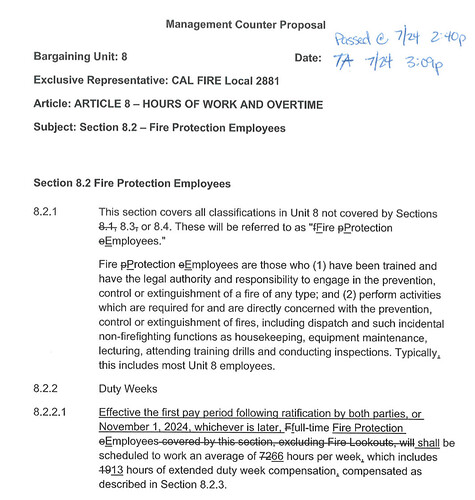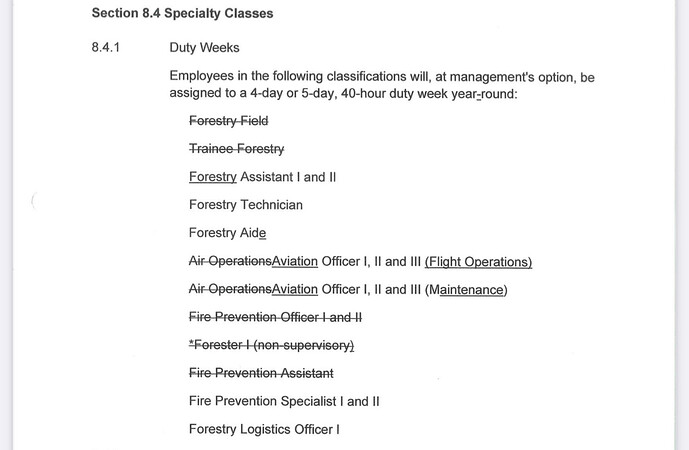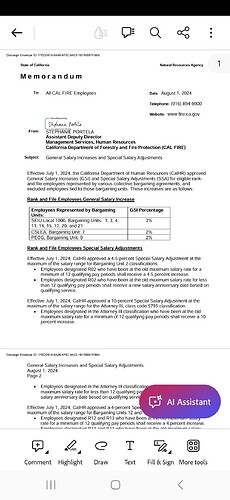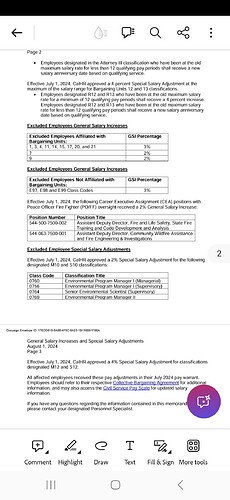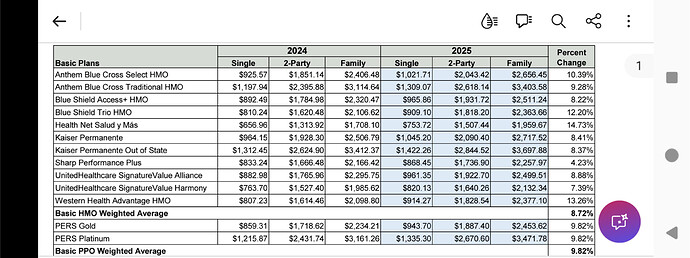All of those classifications mentioned can be on Shift pattern 1, 3, 4 or 7; Shift Patterns 1 and 4 are a 66-hour work week and shift patterns 3 and 7 are only to be used for personnel that are attending formal trainings or any of the CAL FIRE Academies (FFA, COA, RBC, HFEO, ECC, State Fire Training, FFI Academy, and any additional CAL FIRE formal academies).
Reducing 6 hours of standby time per week effectively means no change from the current schedule.
8.3 & 8.4 employees aren’t considered “fire protection”
The 66hr is only for fire protection employees
Read it again… the 8.3 section you cite pertains to 84hr BCs
8.3 non 84hr BCs can be assigned to shift patterns 1, 3, 4 &7. Shift patterns 1 & 4 are non training, 66hr duty weeks.
I want to thank the union for working on this contact. I’m excited to hear the fine details about it.
That being said reading through it I’m not to stoked. We lost 260. Health care going up 10%. And they said GSI increase ‘s. I only see 1 that’s a 2.5% raise. Next year! So we have to wait another year for a raise.
We don’t know if health pay is going up though? If may be going up therefore washing out the 10%.
Yes, we aren’t yet aware of the departments contribution increase to healthcare. That’s why it’s silly for people to throw around this 10% number as a loss, when it will likely be much smaller.
Also, we’re effectively getting a 17% raise to keep our salary whole as we subtract 24 hours off the schedule.
Your pay check will basically be the same.
I’m not here to argue. But I dislike that statement. Same pay for 2.5 years with inflation and cost of living just kind of hurts. That’s my own thought. But I see all the other positives in this contract. I am excited to hear the fine details we might not all understand so could be better than we think. Stay patient
The GSI’s are pretty static across all BU’s 2-3%
There are some special salary adjustments that our 8.4 employees, FP, pilots, FLO’s will see.
Like I said, it’s effectively a 16-18% pay increase to subtract 24 hours of work with no loss in compensation.
This reflects in your OT rate being raised as well.
Can someone who has some personnel experience chime in and confirm how our paycheck should be calculated.
As I understand it this how it should be calculated:
Find your longevity tenure
(((Base Pay + 150 JAC PAY) x longevity percent) + EDWC One time pay) = new Base Pay
That doesn’t seem like a raise at all then to stay even where we were. I didn’t join this place to lose money.
There is no such thing as an “effective”’pay raise. The reduction in duty week is a shell game moving hours around, not a general salary increase.
Folks, be very cautious when you hear terms like an “effective pay raise” or other union talk such as this. As soon as I read this comment my first thought was here come the sales pitch…
I don’t want someone to tell me how the raise works. I want a calculation that outlines all my pay considerations. And I don’t want the answer that, “it’s complicated”. It’s not. It’s simple math. Excel can make a calculator for us as well. This will inform members to the best bottom-line that affects them. But if my calculations are correct, this is a decent and fair deal.
If I did the math correct:
-My salery goes up approx $1,150
-Loss of 24 hrs EDWC is approx $1,080
-6 Hrs of new EDWC rolled into salery is an additional $300
-New hourly OT rate rose about $6 Hr.
So before next year’s GSI it pencils out to roughly 350-400 raise?
*Loss in EDWC factored at old rate
*6 Hours factored at new rate
 that’s literally what effective means. It’s not union talk it’s just basic math. There actually is a small increase beyond our previous salary also, but when you have to work less to make the same it technically is a raise. Especially as previously noted… if you work that additional 24, which was your previous normal shift, you would be making significantly more.
that’s literally what effective means. It’s not union talk it’s just basic math. There actually is a small increase beyond our previous salary also, but when you have to work less to make the same it technically is a raise. Especially as previously noted… if you work that additional 24, which was your previous normal shift, you would be making significantly more.
It’s around a 17% raise to your base salary.
Your base salary does not include the education incentive ($150 JAC certificate), longevity bonuses, hazmat incentives, etc. A top salary FCB is $7075 per month.
Longevity percentage increases do not include the education incentive, so 7075 x your longevity bonus + $150 is your new base salary.
In essence, we are making the same money but working less days per year. 13 or 14 less days per year depending on pay periods per year.
The $260 health incentive essentially was rolled into the 17% salary increase you see to help cover those costs.
So once you do all the math and factor in current salary & EDWC vs. proposed salary & EDWC, it’s about a 4.25% raise which matches the increase in health care costs and inflation.
It’s a very similar raise to what we have seen since 2017, we arent losing money. The come up on this one is that we get paid more to work more, so unplanned OT increases total yearly income BUT the huge come up is that we get paid the same to work 13 less mandatory days per year, if you are a FCB that gets put on shift pattern 1, that turns into 65 less working days a year. Thats a huge incentive for crew captains.
For those on the verge of
retirement, the approximate 4.25% total compensation increase (after factoring current vs projected net incomes) is a persable amount too.
So far I think this is the best TA proposal I have seen in my entire career. It’s the biggest step forward I have seen thus far. What some people are demanding is just not obtainable to expect a 56 hour work week at LA County wages right away. The union is climbing a steep mountain, not rolling through the toll lanes to get us better wages and working conditions so progress isn’t immediate like Gen Z’ers expect.
Disclaimer, all my math is approximate at best and not to be taken as fact nor is it endorsed by L2881.
While the state could step up and do the right thing should we really bank on that. The state is required to pay 85 percent of the weighted average of healthcare. Then 80 percent of each additional dependent. So while we won’t see a 10 percent overall increase. We absolutely will lose some. Probably around 1.5-2 percent. In my case. If coben stays the same I’ll be pay roughly 700 out of pocket but will most likely be around 500 out of pocket for medical for my family.
But I’m also concerned with the fact that it appears to be something that wasnt even bargained for. It was just deleted from the TA and not even touched upon. While all removals are lined through. So was it even bargained for??
